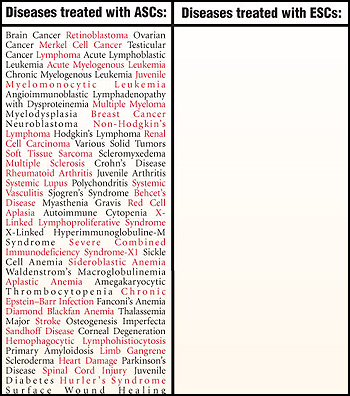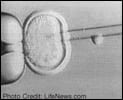Return to Human Cloning Home Page
Why would anyone want to create cloned human embryos?
Some scientists think that stem cells extracted from cloned human embryos will be useful for the treatment of human diseases. They claim that a clone of the patient will provide cells with an identical DNA match for the patient and that stem cells from embryos are more immature and therefore coax-able for development into any cell type. These claims are unfounded for the following reasons:
- First, identical DNA matches cannot occur. To the contrary, a genetic mismatch always results when a donor egg (and therefore the donor DNA) is combined with the separate and distinct DNA of the patient to be cloned.1
- Second, as discovered by researchers at The National Institute of Health, the immaturity of embryonic stem cells is a liability that often results in sporadic and uncontrollable growth, leading to lethal tumors and terratomas.2
Regrettably, the pro-cloning advocates in the medical industry have convinced thousands of patients suffering from illnesses to hope in the spurious claims of some scientists who continuously fail to breakthrough with cures or benefits from embryonic stem cell research.
Are cells from cloned human embryos currently being used to treat any human disease?
No health benefits or cures have derived from stem cells from human embryos. A lack of consistent clinical success in animal trials coupled with the development of dangerous side effects in animals (the formation of tumors and terratomas) has discouraged the use of these cells in human clinical trials. Furthermore, the US Food and Drug Administration has withheld approval from treating humans with embryonic stem cells due to the complications and dangers.
Why are some patient advocacy groups claiming that a comprehensive ban on human cloning will prohibit life-saving research?
Advocacy groups, such as Parkinson’s, Alzheimer’s, March of Dimes, Juvenile Diabetes Foundation, and others have put their hopes in claims that stem cells extracted from human embryos will offer cures for diseases. However, available scientific data indicates that such claims are primarily an aspiration and speculative at best. Currently, there are no successful medical treatments or cures for diseases that can be attributed to embryonic stem cells; in fact, the use of these cells in animal trials has proven unpredictable, often resulting in lethal tumors.
All successful stem cell treatments in humans have been in clinical trials with non-embryonic stem cells. Over 58 diseases have been treated with non-embryonic stem cells.
 |
| From Cloning |
Why do some scientists oppose a comprehensive ban on human cloning?
Human clones and stem cells extracted from human clones can be patented; therefore, tremendous financial incentive to patent the process first is driving some scientists to pursue and perfect human cloning. Second, some scientists have admitted their lack of concern for the ethical implications of creating and then destroying human lives for research purposes; they simply value the research more than the human lives with which they are toying. In other utilitarian words, the end (research for cures) justifies the means (destroying one innocent human life to possibly find a cure for another).
1. “Human Genome Project Information: Cloning Fact Sheet.” National Institute of Health . http://www.ornl.gov/sci/techresources/HumanGenome/elsi/cloning.shtml.
2. “Stem Cells: Scientific Progress and Future Research Directions.” National Institute of Health (2001): ES-9.

